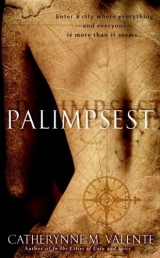
Текст книги "Palimpsest"
Автор книги: Catherynne M. Valente
Жанр:
Классическое фэнтези
сообщить о нарушении
Текущая страница: 4 (всего у книги 19 страниц)
November walks out onto Seraphim Street; her lavender-draped escort takes her arm. A few errant creatures buzz lazily behind her. They sing silently, a long and intricate song, simply to tell their queen, their mother, simply to tell Casimira that they are coming to her, coming, O Mother, O Mistress, and oh, what a thing they have brought!
THREE
THE THREE OF TENEMENTS
The tea at Oleg’s table was bitter and red. He could not quite remember buying it, but was sure he had, of course he had, sometime. Hibiscus something. Blood orange. He didn’t know. He emptied two pills from an equally orange bottle into his hand and washed them down with the phantom tea. It tasted like dead skins shriveled up to bright husks.
“Olezhka,” his sister said. Water spilled out of her mouth, just a trickle. When he was a boy, it had been a torrent. Now it was just a tear. “Your tea is already cold.”
He did not answer her, but shook out two more pills and rubbed a rough-stubbled cheek with one hand. He had dreamed in the night, dreamed until sweat fled from him and soaked the sheets. It had been so vivid—no, not vivid, livid,like a bruise. There had been the taste of sugarcane, and a girl with blue hair, and there had been something like a great iron bird . . .
“You smell like copper keys, brother. And perfume. I don’t wear perfume.”
“Would you rather hear that her name was Lyudmila, or that it was not?” he said softly.
The woman in the red child’s dress combed a long brown weed from her hair, embarrassed, but not for herself—she was forever without and beyond shame. Only embarrassed for him, who could still taste the blond woman’s mouth in his.
“Mila, I’m still a man, I still have blood in me.”
Her wide blue eyes regarded him, absent of guile or cruelty. She had never been cruel—she called herself his pet, his poor old cat, but she did not beg for milk or tear his curtains. She sat at his table, waited for him to come home from school, and then from work, and the years ground against each other like gears.
“I am not angry. When have I ever been angry? Drink your tea.”
He drank, and grimaced. No honey in the house—he always forgot something at the market.
“Do you think a ghost should be angry?” she asked, her wet mouth sopping her words. “I can try, if you think I ought to be. I think I remember ‘angry’—it was yellow, wasn’t it? Like custard.”
Oleg caught her gaze, as a fish catches a barb in its mouth—it must have known such a thing was inevitable. But he smiled. The dyed lace on her collar was twisted up around her neck, and her face was open and sweet, her broad cheeks, her dripping hair.
“I love you, Mila.”
She nodded absently. “Yellow, right?”
“Yes, it was yellow.”
_______
When he climbed out of the bath, she was gone. It was like that. He’d grown accustomed to her comings and goings, as one becomes accustomed to a wayward wife or, indeed, a cat only partially belonging to the places she sleeps. When he was seven he had awoken from some nameless child’s dream-terror to see her sitting on his ashen footboard, knees drawn up to her chin, her dress seeping a wet crescent onto the edges of his blankets.
“That’s mybed,” she had said, and crawled in next to him, sodden and sniffling and cold. She had put her arms around his neck and fallen asleep that way, her face buried behind his ear. In the morning, his father had been furious that he’d wet the bed, and though he knew he hadn’t, he could not argue with the soaked, wadded sheets.
And so it had gone. She was not entirely his sister, nor really his friend. She did not do any of the things he had thought ghosts might do: steal his breath, demand sweets from the cupboard, send him on dangerous quests through the forests. She did not drive him mad. She did not plead for stories of the living. She did not, beyond dripping the Volkhov all over his bed, destroy his things or get him in trouble. He counted himself lucky to have got such a polite ghost. She also knew she was a ghost, or at least that she was dead, and Oleg felt that this was a lucky thing as well, for he would not have liked to tell her about it, about that day on the river, and how his mother cried so loud he heard it deep in her belly, and how he cried too.
Once, when he was fourteen and a brown-eyed girl in his class had made fun of his accent, when he had beat his pillow with his skinny arms and wept the sour, oily tears of that year, Lyudmila had crawled under the covers again, her dress already too short to be decent when faced with such activity, and put her arms around him, her mouth so close to his ear that afterward he would have to hop up and down like a swimmer to get the water out.
“In the land of the dead,” she rasped, weeds tangling up her tongue, “a boy who was run over by a black automobile fell in love with the Princess of Cholera, who had a very bright yellow dress and yellow hair and shiny yellow shoes. The boy chased after her down all the streets of the dead, past the storefronts and the millineries, past the paper mills and the municipal parks. But the princess would not stop running, for cholera is swift as anything. Finally, he caught her in the stillborn slums, where those who have not got anything of life to make a house out of dwell. And she said to him: ‘I will never love you, for you are not one of my people.’ So the boy painted his face white and gray, and wore a yellow rainslicker for her sake, and bled from his mouth for her love. But still she would not look at him with sweetness, and so he was made to go to the city well and draw up the fouled water so that he might forget her, and himself, and all things save the hospice where such unfortunates sleep who cannot find peace even behind the doors of the world.” She kissed his cheek, and ever after he would feel the mark. “So you see? It will all come out right.”
“I don’t really see. That’s a terrible story.”
“But he wasn’t her family. There can be no real love between strangers. I love you, and that is enough.”
But he had loved the brown-eyed girl anyway, though he never touched her, even once. Lyudmila said that this was the way of the world, but he turned his back to her in their thin little bed, and she had not been able to stop him, being as she was and not other than that.
He told no one of her except the doctor who dispensed the pills which did nothing to banish her, and she promised that she had not told her friends about him either. She seemed to grow up more or less as he did, even though she should have been older. Still, she had not chased off his girlfriends or even scowled at the occasional boyfriend or thrown jealous fits on the fire escape. She just sat on the footboard as she always had, and if there was no one in his bed and he could not sleep, she would slip in beside him and he would wake up with wrinkled fingers and drenched pillows.
“I love you, Mila,” he said to the empty room. He did not ask where she went; it seemed like bad manners, and folk who have lived together as long as Oleg and Lyudmila rely on manners.
_______
“You have something on your tummy,” she said as he was brushing his teeth after what could hardly have been called breakfast—still he could not stand the taste of stale red tea on his teeth. She sat pertly on the sink, where she could daintily spit out her water rather than letting it run down her chin.
He looked down—beneath the slight fur there was something. He pulled up the skin of his stomach. Around his navel, brachiating out like a compass rose, were long, spindly black lines, crooked and aimless. He could almost make out writing above them, but it hurt his eyes to peer so close at something upside down. It was the mark that the other Lyudmila had had on her neck—he might pretend he had spilled ink or something, but he recognized it—had he not tasted it, kissed it?
“Maybe you shouldn’t be kissing strange girls,” she said archly. “You could catch something.”
He rubbed at it a little—it stayed, of course. He hadn’t really thought it would come off. Like Mila, he supposed, he was stuck with it. He shrugged. It didn’t much matter. A man who has learned to live with a ghost can live with a scar.
“Mila,” he said, drawing a tired breath, “drop dead.”
She smirked, and spat into the sink. He followed suit.
_______
It was nine days later. Afterward, he would count on his fingers to arrive at the number, sure he was right, within one or two. He’d been called uptown in the stiff kind of cold that growls at engines and whips them cruelly. A young man stamped his feet outside a tall brownstone, blowing into his slender fingers and tugging at a knit cap. Oleg’s breath puffed in the air as he knelt to his work.
Lock-outs: the small, sweet, reliable lost souls who made up the bulk of his business with their forgetful habits and careless keys. He felt fatherly about them, even when it was a septuagenarian in his bathrobe and a cold pipe. Poor kittens, locked into the world.
Oleg looked into the lock, looking deep, as was his habit, looking as he looked into his sister’s eyes, through the imagined telescoping locks of his interior estates, into the kid’s kitchen door just past the threshold, and the chipped white bedroom door, and out of the brownstone into the next, all the way to Brooklyn and still further, to the foaming Atlantic nosing at the strand. He listened as to a seashell, for the lock to cry out its secret grief. It wept; he comforted.
“Thanks for getting here so fast,” the young man said, shoving his hands into his black jacket pockets. He was tall and narrow, dark Spanish eyes, the opposite of soft, generous Lyudmila with her great blond mane.
“My shop isn’t far.” Oleg shrugged. “And we can’t have you turning stray and pawing at neighbors’ doors for fish.”
The young man snorted laughter. They talked in the way one checks one’s watch on the train platform or blows on one’s fingers: something to do, a way to keep warm. The boy’s name was Gabriel. He was an architecture student. He built great miserly things that held locks gingerly, fiercely.
The door popped gratefully open and Gabriel gave a yelp of relief not unlike a puppy seeing his master come home, miraculously, from the frightening world. His black jacket flopped open and Oleg could see, snaking up over his collarbone, a fine mark, as if painted by a calligrapher, black and spindled, branching out as if searching for new flesh to conquer.
Oleg leapt up. He grabbed the man’s shirt before he could stop himself, but Gabriel did not protest, nor even seem surprised. He just smiled, an affable, lopsided smile utterly unlike the ghastly, knowing glances to which Oleg had all his life been subject.
“Go ahead,” the boy whispered. “It’s okay.”
And so Oleg, his hands shaking and wind-reddened, unbuttoned the crisp workday shirt and spread it open, the mark there, livid, alive, darker than dreams.
“Do you know what it is?” Oleg said softly.
Gabriel bent his head to catch the locksmith’s stare and lifted his chin with two brown fingers.
“Don’t you?”
“No, I . . . it was there—”
“When you woke up? Yeah.”
“Tell me, please.”
“I can do better.”
And the architect kissed him, very gently, the way a widow kisses the feet of a statue. His tongue tasted of orange candy. Oleg thought he ought to have been startled, affronted, even, but twenty years in the school of his sister had permanently excised the oughtfrom him. He stiffened, unsure, and the strangeness of an unshaven cheek against his own habitually haggard skin struck him, an oddly innocent thing, more naked even than Lyudmila’s scented face. His hand was still on Gabriel’s chest, and he thought, though such a thing could not be, not really, that the black lines beneath his palm burned.
Oleg sighed into the circuit of the architect’s arms, imagining Gabriel as a great house, elbows unfolding in perfect angles to take him in, to cover him in rafters and drywall, to keep the rain from his head and the cold from his bones. They stood thus as the air thinned in a sudden certainty of snow to come, and kissed a second time on the doorstep before the boy led him in, through the kitchen door just past the threshold, through the chipped white bedroom door, through the tall, thin brownstone, and still further.
_______
When Gabriel entered him, Oleg thought he might break into pieces with the pain of it, but he did not, of course. He opened, his insides unfolding to allow another human within him. He whimpered at the bare walls, trying not to seem unprepared for the strength of it. But Gabriel smoothed his hair and kissed the back of his neck and whispered:
“It’s ok, it’s ok, Oleg. I need you so much. You have no idea.”
413th and Zarzaparrilla
ZARZAPARRILLA STREET IS PAVEDwith old coats. Layer after layer of fine corduroy and felt and wool the colors of coffee and ink. Those having business here must navigate with pole and gondola, ever so gently thrusting aside the sleeves and lapels and weedy ties, fluttering like seaweed, lurching as though some unlunar tide compelled them. The gondolas are rimmed in balsam and velvet, and they are silent through the depthless street. Great curving pairs of scissors are provided in case of sudden disaster, tucked neatly beneath the pilot’s seat.
All along the cloth-canal are minuscule houses, barely large enough for a man to stand straight beneath the rafters. They are houses of shame, and try their best to make themselves small. Every so often the wind, fragrant with juniper and blackberry wine brewing in a great pearl vat somewhere far within the corkscrewing streets, blows a door open, and a great eye, blue or brown or yellow as cholera, will peer out from the jamb. The wind, sensitive to their natures, shuts the doors again as soon as it may.
This is the banking district of Palimpsest, and you must keep a respectful silence. Within the hunched houses a great and holy counting occurs, and even the sun does not wish to interrupt. It has been years since the sky has seen one of the beggars who dwell in the houses, who, once housed, could not bear to be parted from those precious walls, those beatific chimneys, who grew and grew until they filled the places wholly, and could not even be cut from their parlors with gondolier’s scissors. But the clouds judge that they do not cry out in their sleep, and so must be learned in some school of happiness.
Almudena, Mendicant-Queen! The smallest house must surely be hers, most debased, most humble. Her scissors broke here, and she begged each splinter of her house from the great and tall. What creature was it gave her that tiled roof? That oak porch? But it is her mumbling you hear beneath the great green streetlamps with their globes of gold. They say it is her long tail that seeks the street edge in warm weather, sunning its scales on the curb.
Take her what coins you have, she will bite them to know their worth and count them into her memory, which is finite and bounded as her own bones. A rib counts for a hundred, vertebrae twenty-five each, cartilage for decimal places, her liver for units of one million, and neither you nor I will ever see her priceless heart. Without calculating machine, Almudena uses the map of her flesh to recall deposits, withdrawals, points of interest. She cannot, of course, forget her own joints, the mathematics of her own little pancreas, and her lungs cannot be robbed of their accounts. If we were to cut her open, who knows if we would find blood—at night the gondoliers swear you can hear coins rolling through her ventricles, notes folded into cranes fluttering at the ends of her hair, trying to lift her house free of Zarzaparrilla Street and bear her past all dreams of lucre.
_______
Gabriel poles through the jackets, his face bright and wind-whipped—but the wind here is warm, it carries with it red flowers and the sea. Oleg peers over the edge, through the spaces between the coat-waves. He is bent double over the side of the gondola, his vision blurred as though with sudden pain, his hands cold—he feels mold beneath them, mold and metal. He tastes snail flesh in his mouth, and his head throbs with the doubled, trebled, quartered actions of each of his hands, each of his eyes. He shakes it and brass dust falls from his hair, the dust of a thousand keys grinding.
“What’s at the bottom?” Oleg asks thickly, almost catching a noseful of brass buttons.
“I don’t know. Can’t swim, myself. Train tracks? Morlocks? Alligators, definitely.”
Oleg sits back, rubs his head like an old man trying to remember his glasses.
“Why did you bring me here?” he says, staring off into the slamming doors and blinking eyes of the low houses. His gondolier—his? Probably not his, not really, not his own—turns, his haphazard black hair stung with moonlight.
“It’s where I’ve got, Oleg. Only place I could take you. That’s how it works. You sort of . . . lease your skin to this place. This is the part you saw on my chest, so this is where we end up, though I had to hustle to meet you here. And it’s a big favor, Oleg. Now I have to wait till tomorrow night to find out what neighborhood you’ve got on you.”
“What if you sleep with someone . . . new? Without the mark. Where do you go?” Where did Lyudmila go?
Gabriel shrugs and poles through a knot of tweed. “I don’t know. I’ve never been with anyone new. It’s a waste of time. Nowhere, maybe. I don’t like to think about it.”
Gabriel pulls open his shirt, not very different than the one they’d left crumpled in a heap on an old cedar dresser—and the mark is there again, deeper if anything, like sword-slashes, like a flaying. Oleg follows a long brown finger toward the most savage of the black lines, and yes, just above it, in the tiniest possible script, scrawled by a moth or a hummingbird: Zarzaparrilla Street. Crossed by 413th, 415th, and 417th at severe, acute angles, nothing like the soothingly regular grid of New York.
“Besides,” Gabriel laughs, “immigrants never have any money, you know. This is the best place to get some. I guess you could say we’re commuting.” He poles through the coats, enormous bronze scissors stuck through his belt, which he draws now and again to slice through an impassable blue tangle of recalcitrant suits. His voice softens, quiets. “Most of them . . . most of usnever figure it out. Bad dream, they think, or good one. Funny rash, never really goes away, but Doc says it’s fine, nothing to worry about. Why dwell on it? But some people, they just can’t let it go.” He stares at the teetering houses with their enormous eyes blinking out of the windows. “Some people drink themselves out of school trying to find it again, trolling through bars where the shadows are so greasy they leave trails on the walls, just to find a way in, a way through. Some people forget too that you’re supposed to stop sleeping, you’re supposed to have a life in the sun.”
“Is it always dark here?”
Gabriel sniffs, wipes his eyes with the cuff of his coat. He seems so young, young and tired and needful. “No, no, ’course not,” he says. “We just never come here in the daytime.”
Oleg looks over the rim of the boat again. There are flower garlands strung there, calla lilies, he thinks, and bluebells. They sag into the clothed street; their smell is old, a remnant, a relic.
“But it isa dream, after all,” he says to the woolen tide. “Nothing matters in a dream. It’s just . . . crazy things, over and over until you wake up.”
There is a long and somehow ugly ?ilence. “Sure,” Gabriel says, “just a dream,” but his eyes are hollow, shallow, low and dim. “What else?”
Oleg trails his hand in the street. He is good at the ephemeral, at ghosts, at dreams. At veiled things and at the untouchable. If it’s a dream, he will be all right; these are places he can know. If he can bring up a ghost, he can find his way to waking in this place.
Gabriel pulls the gondola into a little dock and lashes it to the pole. He smiles, but it is breezy and thin.
“Time to punch the clock,” he says.
They enter a great cathedral-like building of deep blue glass from buttress to cornice. A few others straggle in after them, and Oleg follows Gabriel’s lead as they receive aprons from an absurdly tall and silent man with glossily spotted giraffe legs, along with fine shirts, rouge for their cheeks, cologne. They pass through a long hallway lined with portraits of maître d’s with proud aquiline noses. Before them dozens of tables spread out with ruby-colored tablecloths and pearl candelabras—it is a restaurant, vast and bustling.
“Don’t look at them,” Gabriel whispers as he takes a tray of slim goblets filled with hot strawberry wine.
“At who?” Oleg struggles under the weight of his own burden: globes of white butter clattering in little dishes of hollowed-out diamonds, square loaves of moist, spiced bread. Pressed into service as a waiter, he thinks. Wonderful.
“The patrons,” Gabriel hisses. “It’s the law, here. You can never look them in the eye. Keep your head bent, like you’re praying.
There shouldn’t be any need to speak, and anyway they aren’t allowed to talk to you unless they call you ‘Novitiate.’ ”
“How do I take their orders if I can’t speak?”
“There’s only one dish here. Just put the plates down and go back to the kitchen for more. Get through the night—you’ll be paid, and it’s better to have money here than not to.”
And so they work. After the wine and bread come snails in flaming brandy with thin little slices of banana sizzling in their shells, followed by great bone platters piled up with obscene slabs of meat, ruby-bright steaks that slide over the rims of the plates, crusted in broiled white-brown skin: albino elephant,Oleg hears ten, twenty dinners breathe in ecstasy. The meat is crowned with tumbling cascades of pomegranate seeds, drenched in honey-amber wine. The smell of it is so rich and sweet it nearly knocks Oleg back—his stomach clenches, but they will not allow him to eat.
“Novitiate!” cries a woman with three rings on her right hand and a coiling bracelet of silver and agate on her left that winds around all her fingers and up her arm. Oleg is careful not to look at her. His feet ache from the pilgrimages to the kitchen, and he does not want to talk to her. Her fingernails are wet with pomegranate juice.
“How long have you lived in Palimpsest, Novitiate?” she asks haughtily.
“I . . .”
“Speak up!”
“I think this is my second night, if I understand everything.”
She claps her hands and squeals, a high sound like a broken chime. “I thoughtso! Your gait is quitegauche. An immigrant! How charming! Tell us, boy, is it true that you can’t see yellow or blue? That you feast in the rubbish heaps after we’ve all gone to our ?eds and our teawine? That you all get here by . . .” She leans down to catch his eye, to get him in trouble, but he averts his gaze in time, and sees only her long red hair brushing her wineglass, still streaked with strawberry. “Well, by rutting like filthy old cows? What do you eat? You musttell us all your foul rites!”
Oleg fixes his eyes on his shoes. His face burns with a shame he did not know, until this moment, he possessed. He has not heard the word immigrantflung like that since he was a boy—of course, he is an immigrant. There and here. The strange woman with her hooting, triumphal laughs and her gingery perfume makes him want to run, and also to stay and grind her glass into her face.
Slowly, with a deliberateness he savors, and will savor still in the morning, he raises his head and stares at her directly, her clear, spangle-painted eyes, her cheeks with tiny jewels embedded in the skin which is just beginning to show wrinkles, laugh lines, without bitterness or malice. Silence crashes through the hall and explodes at his feet.
“I’m sure,” Oleg says evenly, “it’s all true. Every word. Want to come to the rubbish heaps with me? We can rutunder the moon and see where you end up.”
The woman’s violet mouth opens slightly, perhaps in shock, perhaps in pleasure at being confronted at last with real live immigrant manners. The giraffe-legged maître d’ surges up behind him and cuffs his ear with one enormous, manicured hand. He seizes Oleg’s arm, and without a word hauls him from the glassy cobalt hall and deposits him unceremoniously onto Zarzaparrilla Street.
Gabriel strolls out a few minutes later—sweet boy, good boy, loyal compatriot.
“I told you,” is all he says, as he pulls the gondola’s lead free of the dock and pushes them out into the street of coats again. He is cold, as though Oleg transgressed against him personally, embarrassed him, made him a fool.
“But it’s a dream,” Oleg insists. “It was fun. We won’t even remember it in the morning.”
“You don’t know anything, Oleg,” sighs Gabriel, and they do not speak while the wind picks up through the last, late stars and light begins, lemony and cool in the east.
“Give me the scissors?” Oleg says finally, smiling as brave and bright as he has ever learned to do. But Gabriel has turned away; his gaze is over the sweet, small rooftops, down alleys Oleg does not know. He is gone: softly, subtly, irrevocably. He doesn’t turn to look, or graze fingers as he hands over blades longer than his legs. Oleg stands, nearly toppling them, and holds his architect—not his, not really—and whispers against his neck his best apology:
“I want to tell you a story. It’s short, I promise. And it’s about love. See, in the land of the dead, a boy who was run over by a black car fell in love with the Princess of Cholera, who had a very bright yellow dress and yellow hair and shiny yellow shoes . . .”
But Gabriel is not listening, and his back is stiff beneath his coat. Oleg sadly takes up the bronze scissors and knifes through the flowing street below the boat. Dismayed threads pop free of shoulder seams; buttons fly. Below he sees nothing but more sleeves and brume, but he is both a swimmer and a maker of keys, and he knows how to fit himself into gaps too small for others. He cannot stay in the wreck of Gabriel’s disapproval, and the night is almost done. Oleg holds his breath and dives blade-first: he falls and falls, so far.
_______
In a train station, a woman with blue hair is suddenly dizzy; on a street of cedar, a beekeeper in a long dress sneezes as her nose fills with wool.
_______
There is a river flowing beneath the street of coats, a river the color of milk. It is slow and thick, rolling in long, lugubrious currents of cream and curdle. There is a flannel sky over it, and a long brick tunnel overgrown with golden moss and flabby, half-translucent mushrooms, slick and silver, like the flesh of oysters. It has fallen through in places, and Oleg has fallen through the places.
He walks along the bank, a crumbling, ornate rill carved with lamenting faces whose tears feed the river. Their mouths contort, their eyes plead, and they pass by unmarked beneath his feet. He limps, and this disturbs him, for in dreams does not one fall painlessly, like a sigh?
There is a bench, one of those that seem, wherever they are, that they ought to have been in Paris, with a view of the Seine. There is a woman sitting there in a long dress, watching the mushrooms flutter. As he draws closer, the dress becomes deeply blue, spattered with silver stars. It is formal; it has a bustle like the base of a cupola. Her hair is wild and loose, though, mouse-colored, very like his own, and strung through with snow, though no flakes fall underground. She turns to face him and he groans; the mushrooms recoil.
“I missed you, Olezhka,” says his sister, and holds out her long arms.
FOUR
THE ARCHIPELAGO
Lucia was gone.
Ludovico sat naked in his hall, cross-legged, as if to be shriven. The Etymologiaeflowed up the walls around him: Lucia’s breadcrumbs, all raven-devoured, and he the child left behind in the wood. He touched them, the tiny grooves in the paint, places where she had been, where her fingers had moved. If he closed his eyes he could dwell in the circuit of air that had once held her, he could hold his breath and be inside her again, within the close and burning borders of her—she stood here, washed her hair in this sink, wrote upon this wall, ate roasted chicken at this table. There was no place he could enter where she had not also been, her echoes hanging in the air like pages hung to dry. No place that did not suppurate in her absence, which was not ringed with the light of her old selves, like film burned with a cigarette.
He could smell her leonine scent in their bed, and would still, even weeks after she had slept there. He could not bear to sleep where she had, to ruin the imperceptible outline of her body, which was surely now only a fevered hope and a lie of unwashed linens. Her laugh, harsh and cruel and short, hung like garlands of blackened roses by the long, thin windows. He had hardly eaten but to put his teeth to the bones she had left on a chipped plate in the kitchen, to fit his mouth to a dead thing she had once worried.
Ludo pressed his cheek to the wall, and the letters warmed beneath him like her shoulders in winter: Cum leones dormierint, vigilant oculi; cum ambulant, cauda sua cooperiunt vestigial sua, ne eos venator inveniat. . . the words bent the corner sharply, winding on past the telephone table with its slender green lamp. When lions sleep, their eyes are ever watchful, and when they walk, they obliterate their tracks with their tails so that the hunter may not find them . . .
Ludo dug his nails into leones, into ambulant, as if to unearth from them her face, her stride, her long golden tail brushing paw prints from the scrub-dust.
They had always been beasts, curled and snarling in their cave, intractable, invidious. Of course they had, chimera and saint—but hadn’t they made their monstrous contract, hadn’t they eaten youths together and made a lair of these five rooms? Hadn’t he seen her face in some shield years past and been rooted to this floor, his stone arms pinning her to him? Where could she even dream of going that he would not already be there, knowing her as he did, knowing her best, knowing her nature, her origins?








